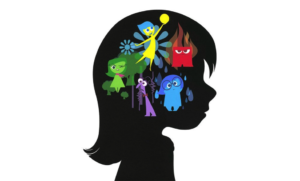There is a scene in Inside Out — Pixar’s 2015 animated film set in the mind of Riley, a young girl unsettled by her parent’s decision to move to San Francisco — that illustrates the true reality of depression. As joy and sadness, two of the five emotions that fill Riley’s mind, vacate her consciousness in an attempt to save soon to be forgotten memories, they leave a child devoid of feeling.
It is often assumed that a person becomes depressed as a result of sadness overwhelming any remnants of joy or positivity; leading to the notion that we shouldn’t suppress sadness, but acknowledge it, as it helps us understand what joy really is.
In reality, however, depression doesn’t care for sadness any more than it does for joy. Inside Out, made all the more impactful by its focus on an innocent and vulnerable child, illustrates how it is not just the absence of joy that drains colour and motivation from someone’s life, but the absence of emotions altogether. Stripped of any form of feeling, joyful or sad, it becomes difficult to interpret or respond to everyday occurrences.
Depression manipulates the mind to assume that there is no worth nor value to life. It lies to us, emphasizing that we aren’t relevant or important to others. And, even if we are told that we are, the lack of sentimental perception brushes off support as meaningless. This is why, to tackle depression, it is so vital to intervene at the earliest stage possible.
Fortunately, I don’t write from personal experience. Perhaps it is thanks to the lessons taught by Inside Out and those around me that I have been able to fend off apprehension, constructing a mindset that acknowledges how the sun also rises. But, living in Northern Ireland, it is impossible to remain immune to the topic of mental health. We are in a state of emergency that it is getting worse almost every passing day.
According to a recent report by Samaritans, 28 men and 9.5 women per 100,000 of the population take their life each year. This is significantly higher than the UK or Republic of Ireland and demonstrates the severity of the issue. These statistics, of course, only cover some of those who were unable to overcome depression.
There are thousands more who battle every day, many of whom live in constant torture and are forced to endure unimaginable darkness. So, what can be done about it? How can we begin to turn the tide and construct a less toxic society?
Many place the blame on government. With no working assembly for almost three years there had been no reallocation of funding to boost the resources available for mental healthcare, nor has there been any desire to create systematic change to the manner in which the situation is managed.
The burden has been put on charities, communities, families and friends, with Northern Ireland’s political parties for a long time preferring to send ‘thoughts’ and ‘prayers’ than to establish a working government that could instigate long-term change. The wakeup call has come and gone, taking with it an incomprehensible tally of individuals and leaving people across Northern Ireland in crisis.
Evidently, there is no easy way of tackling the issue and carers will be forced to work with what they have until government action finally arises, now that the devolved institutions have been restored. We must support them, continue to call for political action and broaden the discussion on mental health ever further.
Alas, for many it is too late. But we can work to give them a legacy and ensure that their departure is not in vain. By helping others just like them, either directly or by supporting charities, we can make a real difference. Remember, our discussions of topics as sensitive as mental health have a significant influence upon the way people respond to distress and moments of crisis.
Creating a more responsive, supportive public discourse on suicide is vital to the well-being of the most vulnerable in society.

